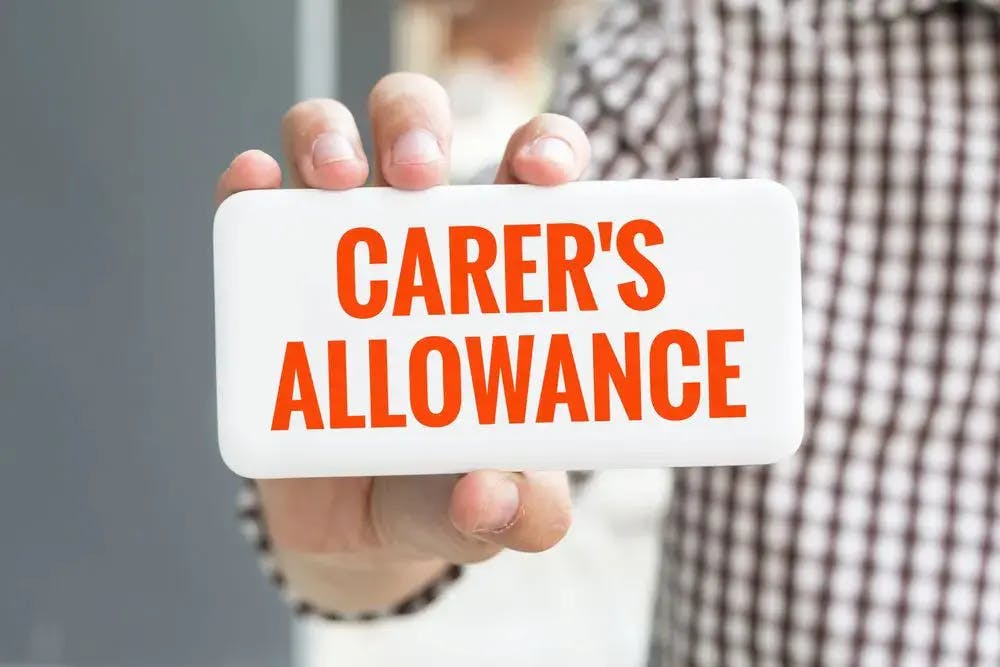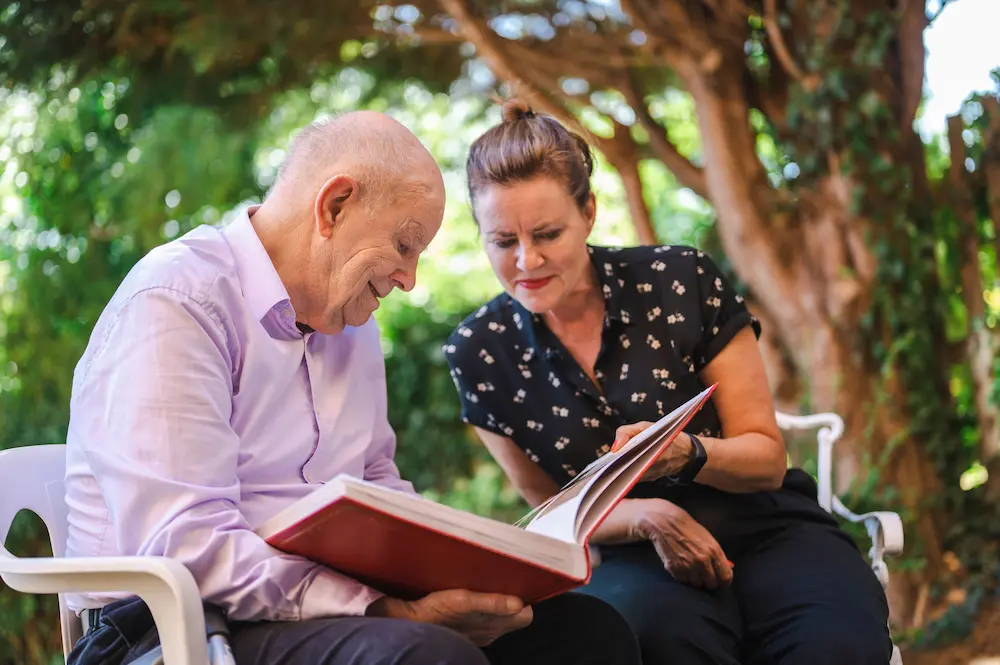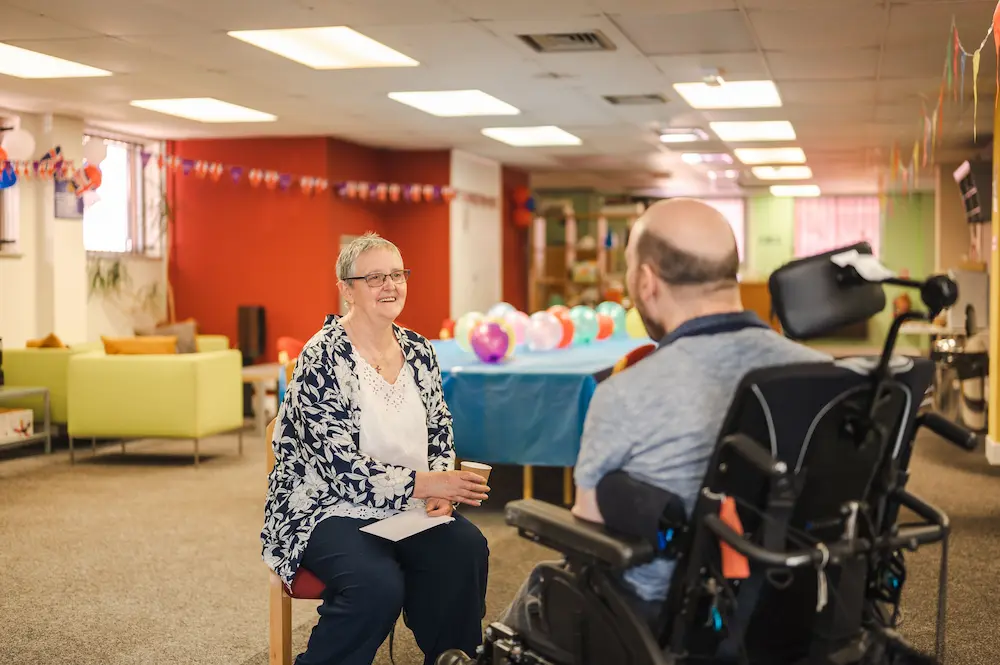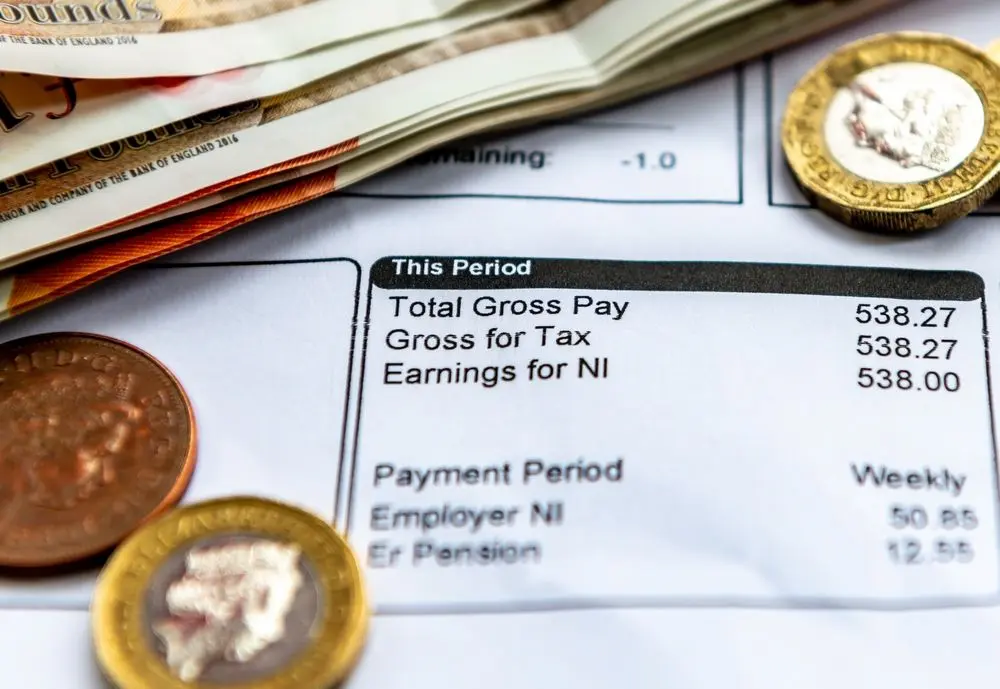Carer’s Allowance Explained | How This Benefit Works

Estimated Reading Time: 15 minutes
This article was reviewed by Sara Chapin, Director of Finance at Lottie, on 16th December 2024, to ensure accurate and trustworthy information for care seekers. Sara Chapin has been a Certified Public Accountant with the National Association of State Boards of Accountancy since 2017. Next review due December 2025.
Carer’s Allowance is the main benefit that carers can receive. If you’re looking after someone for 35 hours a week or more, you may be eligible. For 2025/2026, Carer’s Allowance is paid at £83.30 a week.
Many people who claim this benefit act as a carer for a family member or parent - and often do so without realising they’ve taken on a caregiving role.
Here, we’ve covered everything you need to know about Carer’s Allowance, including how it works, how to claim Carer's Allowance and what to do if you receive any other benefits.
Arrange care at home
Browse the best home care in your area.
In this article on carer’s allowance:
- What is carer’s allowance?
- How much does carer's allowance pay?
- How is carer’s allowance paid?
- What are the conditions for claiming carer’s allowance?
- How can I claim carer’s allowance?
- Changes of circumstances
- Backdating a claim
- If you think the decision is wrong
- Other benefits
- What to do if you get other benefits
- How Carer’s Allowance is affected when entering care
What Is Carer’s Allowance?
Carer’s Allowance is a benefit for people who are providing regular and substantial care to somebody who isn’t able to look after themselves on a daily basis. If you’re caring for a family member or someone else, you may be eligible for additional financial support.
Carer’s Allowance is a taxable benefit that forms part of your taxable income. This is known as the main benefit for carers. If you look after a loved one or somebody else for 35 hours a week or more then you may be eligible.
For detailed information about how to claim, how long the form will take to complete and how long it takes to get a decision, download our Carer’s Allowance guide, written by our Lead Care Expert Hannah Karim.
How Much Does Carer's Allowance Pay?
Carer’s Allowance is paid at a standard rate for the person making the claim. The 2025/2026 Carer’s Allowance rate is £83.30 a week. We’ve outlined what you’ll get on a weekly, four-weekly and yearly basis in the table below.
| Carer’s Allowance Rate 2025/2026 | Carer’s Allowance Rate 2024/2025 | Increase | |
|---|---|---|---|
| Per Week | £83.30 | £81.90 | £1.40 |
| Every Four Weeks | £333.20 | £327.60 | £5.60 |
| Per Year | £4,331.60 | £4,258.80 | £72.80 |
You can check the current rate of Carer’s Allowance on GOV.UK.
This carer benefit isn’t based on your income and capital (or that of any partner). This also means that there’s no cap on how much you can earn from work while still being entitled to Carer’s Allowance.
Though this benefit is taxable, you’ll only have to pay tax if you have other sources of taxable income, such as occupational or personal pensions, or other part-time earnings that take you over the tax-paying threshold (up to £12,570) when combined with what you get for Carer’s Allowance. On its own, Carer’s Allowance is below this threshold.
If you receive the State Pension
You’re unable to receive the full amount of Carer’s Allowance and the State Pension at the same time. This means that if your pension is worth £83.30 a week or more, you won’t be eligible for Carer’s Allowance, but if your pension is worth less than £83.30 a week, then any Carer’s Allowance payment you receive will make up the difference.
If you receive Pension Credit
If you’re eligible for Carer’s Allowance but already receive Pension Credit, a Carer Addition will instead be added to your award which will cause your Pension Credit payments to increase.
How Is Carer’s Allowance Paid?
Carer’s Allowance is normally paid directly into a bank account, building society or Post Office card account. If you aren’t able to open or manage an account then the Department for Work and Pensions will pay you using the Payment Exception Service.
You can choose to be paid weekly in advance or every four weeks.
As long as you’re eligible, you’ll continue receiving Carer’s Allowance.
What Are The Conditions For Claiming Carer’s Allowance?
To be eligible, you need to meet certain criteria, including providing at least 35 hours of care a week to one person who receives a qualifying disability benefit. We've outlined full eligibility criteria below.
Personal eligibility criteria
You’ll need to meet all of the following conditions:
- You spend at least 35 hours a week caring for one person (you won’t get Carer’s Allowance if you care for more than one person)
- You’re aged 16 or over
- You earn less than £196 a week after deducting tax, National Insurance and expenses
- You aren’t in full-time education or studying for 21 hours a week or more
- You’ve lived in England, Scotland, Wales or Northern Ireland for at least two of the last three years
- You usually live in England, Scotland, Wales or Northern Ireland (or you live abroad as a member of the armed forces)
- You aren’t subject to immigration control
The person you care for
The person you’re caring for needs to receive at least one of the following disability benefits (these are known as ‘qualifying benefits’):
- Adult Disability Payment (the daily living component)
- Armed Forces Independence Payment
- Attendance Allowance
- Child Disability Payment (the middle or highest rate of the care component)
- Constant Attendance Allowance at or above the normal maximum rate with an Industrial Injuries Disablement Benefit
- Constant Attendance Allowance at the basic full-day rate with a War Disablement Pension
- Disability Living Allowance (the middle or higher rate of the care component)
- Personal Independence Payment (the daily living component)
The care you provide for this person
The 35 or more weekly hours of care you provide for somebody could include:
- Assistance with household tasks such as washing, cleaning, food preparation and cooking
- Helping out with other household and administrative tasks like managing finances and shopping
- Providing transport, including to and from doctor’s appointments
If somebody else provides care for this person and they already claim Carer’s Allowance, you won’t be able to do so as well. You can speak to the other carer and see if they’re willing to change their benefits. If they aren’t, you can still apply. The Department for Work and Pensions (DWP) will then decide who should receive the benefit.
To make applying easier and to learn the information you'll need to provide, download our Carer’s Allowance checklist and guide, written by our Lead Care Expert Hannah Karim.

How Can I Claim Carer’s Allowance?
To claim Carer’s Allowance, you can:
- Use the online Claim Carer’s Allowance service through GOV.UK
- Download and print a Carer’s Allowance claim form. You can then fill this in and sent it by post
While you can’t make a claim by phone, if you need help then we’d recommend contacting the Carer’s Allowance Unit. Their telephone number is 0800 731 0297.
You need the following documents and information to apply for Carer’s Allowance:
- National Insurance number (and your partner’s number if you have one)
- Bank details (unless you receive State Pension)
- Employment details and payslips (if you’re currently working). This should be the payslip immediately before the period you want to claim from and any received since
- P45 (if you’ve recently finished working)
- Most recently finalised accounts for your business (if you’re self-employed)
- Any course details (if you’re studying)
- Any expenses incurred, such as the cost of paying for care while you’re at work
- Details of the person you care for, such as their date of birth and National Insurance number (if they’re over 16) or Disability Living Allowance reference (if they’re under 16)
To make applying easier and to learn the information you'll need to provide, download our Carer’s Allowance checklist, written by our Lead Care Expert Hannah Karim.
Changes Of Circumstances
If you become aware of a change that might affect the amount of Carer’s Allowance you can get (or whether you’re still eligible) then you should let the Department for Work and Pensions know as soon as possible.
This change might increase your payment and you may miss out on extra money as a result if you let the Department for Work and Pensions know too late.
If you think a change might reduce your payment then you should also let the Department for Work and Pensions know. If you tell them too late then you may be paid too much and have to pay back any benefits you’ve claimed.

Backdating A Claim
Your claim can be backdated for up to three months if eligible. You don’t have to offer a reason why you’re claiming late.
If the person you care for has recently been awarded a qualifying benefit, try to claim Carer’s Allowance within three months of this award. Doing this will mean your Carer’s Allowance can be backdated to when they started their claim for the qualifying benefit - even if this was more than three months ago.
When applying, request for your Carer’s Allowance to be backdated. You should ask for this on the claim form where it states “When do you want your Carer’s Allowance to start?”
If You Think The Decision Is Wrong
If you disagree with a decision that’s been made about your Carer’s Allowance claim, you can ask for it to be looked at again. This is known as a mandatory reconsideration. If you still disagree with the further decision then you can appeal to an independent tribunal.
A reason you may disagree with the decision is if you believe incorrect information has been used. You may disagree with the decision if you think you’re getting the wrong amount or if you’ve been refused Carers Allowance support.
Time limits are strict - you’ll usually be given one month to dispute a decision - so it’s really important that you quickly seek advice and take action.
If you’re unhappy with the service you’ve received from your local benefits office or the Department for Work and Pensions, you can complain. This may be down to errors, delays, rudeness or difficulty when trying to get in touch with them. You can do this regardless of whether or not you also want to challenge a decision.
Carer’s Allowance and Other Benefits
There are a variety of other benefits that carers may be entitled to, depending on individual circumstances and any other benefits you're already receiving.
We’ve gone through the most common benefits below:
Carers credit
This National Insurance credit fills up gaps in your National Insurance record. Receiving Carer’s Credit allows you to take on caring responsibilities, without affecting your ability to qualify for State Pension.
Even if you don’t qualify for Carer’s Allowance (or the Carer’s Element of Universal Credit), you may be able to claim Carer’s Credit, where entitlement to the State Pension can be built up by providing care for 20 hours a week or more.
You may be eligible for Carer’s Credit if:
- You’re aged 16 or over
- You aren’t claiming State Pension
- You don’t qualify for Carer’s Allowance
- You spend at least 20 hours a week caring for someone
- The person you care for gets a benefit because of their illness or disability (such as Attendance Allowance, Disability Living Allowance, Personal Independence Payment or Armed Forces Independence Payment)
You don’t need to apply for Carer’s Credit if you:
- Receive Carer’s Allowance (as you’ll automatically get credits)
- Receive Child Benefit for a child aged under 12 (as you’ll automatically get credits)
- Are a foster carer
To apply, download the Carer’s Credit claim form.

Pension credit
This is extra money for pensioners to bring their weekly income up to a certain amount.
This benefit can be claimed once you’ve reached State Pension age and is separate from your State Pension itself.
Pension Credit tops up:
- Your weekly income to £218.15 if you’re single
- Your joint weekly income to £332.95 if you have a partner
If you live with a partner, you’ll only be able to claim Pension Credit if you’ve both reached State Pension age.
You could also get an extra £45.60 a week if:
- You get Carer’s Allowance
- You’ve claimed Carer’s Allowance but aren’t being paid because you already get another benefit paying a higher amount
One in three people who are entitled to Pension Credit don’t claim it, so if you think you may be eligible then be sure to check.
Apply for Pension Credit here.
Carer premium
To be eligible for a Carer Premium, you must spend at least 35 hours per week caring for someone. If a Carer Premium is received on top of other benefits it will amount to £45.60 weekly. If you claim Universal Credit then this premium is instead paid monthly at £198.31.
You may be entitled to an additional Carer Premium if you already receive:**
- Income Support
- Universal Credit (and receive the ‘carer element’)
- Housing Benefit
- Council Tax Support
- Income-based Jobseeker’s Allowance
- Income-related Employment and Support Allowance
- Pension Credit (and receive the ‘carer addition’)
To find out if you’re eligible for Carer Premium or to start receiving it, enquire at your local Jobcentre Plus or Jobs and Benefits Office. However, if you qualify then this payment will normally be automatically added to your benefit.
Local welfare assistance
If you have a sudden change to your finances or an unexpected situation arises while receiving certain benefits or when on a very low income, you may be able to get some help in the form of local welfare assistance. There are no set guidelines for this and it varies for each local authority across the UK.
England
Find your local council to see what help they can provide.
Scotland
Learn more about the Scottish Welfare Fund on the mygov.scot website.
Wales
Learn more about the Discretionary Assistance Fund on the Welsh Government website.
Northern Ireland
Learn more about the Social Fund on the nidirect website.
Young Carer Grant (In Scotland)
If you’re aged 16 to 18 and live in Scotland, you may also be able to apply for a Young Carer Grant of £359.65 a year. This new scheme started on 21st October 2019 for young carers who spend an average of 16 hours caring for people who have received a disability benefit for a minimum of three months.
You can receive this grant alongside Carer’s Allowance if you meet the criteria for both.
You can apply for a Young Carer Grant through mygov.scot.
Carer's Allowance Supplement (In Scotland)
Carer’s Allowance Supplement is a payment for people who live in Scotland and receive Carer’s Allowance on a set date. If you’re living in Scotland and you’re already receiving Carer’s Allowance, you’ll automatically receive the supplement.
This is paid twice a year by Social Security Scotland and should be paid automatically, so there’s no need to apply for it.
This benefit was brought in by the Scottish Government as a temporary payment until Carer’s Allowance is replaced by a new Scottish benefit. It was introduced to quickly increase the amount of Carer’s Allowance paid to carers in Scotland.
This payment is a lump sum that covers a six-month period, either:
- June 2024 to November 2024
- December 2024 to May 2025
The next two payments are:
- £293.50 from June 2025 (you’ll have received this payment if you were getting Carer’s Allowance on 14th April 2025)
- £293.50 in December 2025 (you’ll have received this payment if you were getting Carer’s Allowance on 13th October 2025)
What To Do If You Get Other Benefits
You’ll get no Carer’s Allowance or a lower amount of it if you receive certain other benefits, including:
- State Pension
- Contributory Employment and Support Allowance
- Contribution-based Jobseeker’s Allowance
- Maternity Allowance
If your Carer’s Allowance is either the same as or less than the other benefit, you’ll get the other benefit instead of Carer’s Allowance.
If the other benefit is less than your Carer’s Allowance, you’ll get the other benefit and the balance of your Carer’s Allowance on top.
If you get any income-based benefits
These types of benefits are known as ‘means-tested benefits’. Carer’s Allowance counts as income when these benefits are worked out.
If you’re eligible for Carer’s Allowance - regardless of whether or not you’ve applied for it - you’ll receive an extra amount of Universal Credit known as a ‘carer’ element.
You can also get an extra amount of money called a ‘Carers Premium’ or ‘Carers Addition’ added to any of the following benefits if you get Carer’s Allowance:
- Pension Credit
- Income-based Jobseeker’s Allowance
- Income-related Employment and Support Allowance
- Income Support
- Housing Benefit
- Council Tax Support
Does the benefit cap apply to Carer’s Allowance?
The benefit cap is a limit on the maximum amount of benefits you can receive per year. Your benefit cap will be determined by whether you live inside or outside of Greater London, whether you’re single or in a couple and if any children live with you.
For example, the benefit cap for people in a couple who live outside of Greater London is £423.46 per week and £1,835 per month.
However, if you or your partner receive Carer’s Allowance, you won’t be affected by the benefit cap, meaning there’s no limit to the amount of benefits you can get.
People who have reached the State Pension age are also exempt.
How Carer’s Allowance Is Affected When Entering Care
If the person you’re looking after goes into full-time care, such as a care home, you’ll only be able to continue claiming Carer’s Allowance if they continue receiving a qualifying disability benefit and you still provide them with at least 35 hours a week. For this to be the case, the person you care for will probably be paying for their own in a setting such as a care home.
These benefits usually stop four weeks after moving into care. The main exception to this is when somebody pays for their own care:
- Attendance Allowance
- Disability Living Allowance - The care component
- Personal Independence Payment - The daily living component
If your Carer’s Allowance stops due to the person you’re looking after moving into full-time care, you can continue receiving the following for eight weeks:
- The carer premium or addition paid with any means-tested benefits
- Income Support (the amount you get should increase to the amount you were getting for Carer’s Allowance and Income Support combined)
Loading FAQs...
Loading the form...



